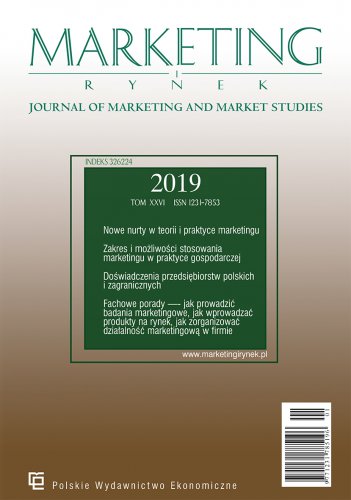Wpływ kampanii społecznych na prozdrowotne zachowania kobiet i mężczyzn w Polsce
The objective of the article is to indicate that social marketing campaigns have an impact on pro-health behaviors, particularly of women, as they have greater health awareness than men, due to the socialization. It is also interesting to recognize how the youngest (Millennials) generation women and men differ from the representatives of the Baby Boomers generation in this respect. The study uses the results of the exploratory quantitative survey conducted in the third quarter of 2021 among patients of a selected first contact medical facility located in Poland. The questionnaire was available to patients of this medical facility for two months. 217 of them filled the questionnaire (random sample). It turned out that men know a higher number of pro-health social campaigns than women, and more frequently believe that they contribute to disease prevention. However, this is not statistically significant and needs to be confirmed in further studies. The results also showed that male representatives of the Baby Boomers, compared to youngest men (Millennials), more often perceive social campaigns concerning health protection and prevention. This difference is statistically significant and not observed in the group of women. There is no theoretical research underpinning this study in Poland, so this article provides a significant input into the theory of social marketing in the field of pro-health campaigns and their influence on disease prevention. Medical facilities can use the results of this research as an argument for their activities toward social marketing. The observations were made only among patients of one medical facility, thus excluding the possibility of generalizing the findings. Therefore, this empirical research should be treated as an exploration of the subject matter for further surveys.
Celem artykułu jest wskazanie, że kampanie społeczne mają wpływ na zachowania prozdrowotne kobiet i mężczyzn. Hipotezy badawcze dotyczą przede wszystkim różnic w podejściu do tego zagadnienia obserwowanych u kobiet i mężczyzn z generacji milenialsów oraz baby boomers. W artykule wykorzystano wyniki badania eksploracyjnego, które zostało przeprowadzone w trzecim kwartale 2021 r. wśród pacjentów wybranej placówki medycznej w Szczecinie (uzyskano 217 wypełnionych ankiet). Wyniki badania wskazują, że mężczyźni znają więcej prozdrowotnych kampanii społecznych niż kobiety oraz częściej są przekonani, że kampanie społeczne mają znaczenie w profilaktyce zdrowia, chociaż te różnice między płciami nie są statystycznie istotne. Mężczyźni z generacji baby boomers istotnie częściej niż przedstawiciele milenialsów dostrzegają kampanie prozdrowotne jako działania mające wpływ na profilaktykę zdrowotną. Tej zależności nie obserwuje się w przypadku kobiet. W Polsce brak jest tego rodzaju badań, więc artykuł stanowi istotny wkład do teorii marketingu społecznego w obszarze znaczenia kampanii prozdrowotnych dla profilaktyki zdrowia. Artykuł zawiera także implikacje praktyczne: przychodnie medyczne mogą wykorzystać wnioski płynące z tych badań w swoich działaniach w obszarze marketingu społecznego. Badaniami objęto pacjentów tylko jednej przychodni, więc ich wyników nie można uogólniać, ale można je traktować jako eksplorację w kierunku dalszych badań nad zagadnieniem wpływu kampanii społecznych na zachowania prozdrowotne.
Słowa kluczowe: marketing of medical facilities; pro-health campaigns in Poland; social marketing (zarządzanie instytucją medyczną; kampanie prozdrowotne w Polsce; kampanie społeczne; marketing społeczny)

